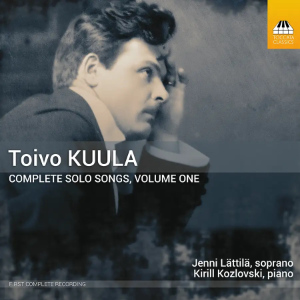
Toivo Kuula (1883-1918)
Complete Solo Songs Volume 1
Jenni Lättilä (soprano)
Kirill Kozlovski (piano)
rec. 2018, Kokkokangas Hall, Kempele, Finland; Snellman Hall, Kokkola, Finland
Toccata Classics TOCC0719 [59]
If one asked a Finnish music lover around 1912 to name Finland’s greatest composer after Sibelius, Toivo Kuula would be a likely answer. Kuula’s early studies were interrupted more than once, and his personal life, with a loveless marriage, was no better, but none of that stopped him from composing. His songs and choral works are beloved in his country. His life stabilized after his second marriage to the singer Alma Silventoinen in 1914. They moved to Viborg, where he had been appointed conductor of the Friends of Music. All went swimmingly until he was murdered in a political dispute after the end of the Finnish Civil War.
The disc is the first of two which will comprise Kuula’s complete songs. It should be said right off that soprano Jenni Lättilä and pianist Kirill Kozlovski exceed all expectations in their performances. Ms. Lättilä’s singing is especially notable for the varied characterizations in each song, and her enunciation appears flawless – as far one can tell without knowing Finnish. She can put over the most operatic songs, like The Maidens Bathing, and produce a notably subdued tone for the quieter songs such as Summer Night and some of the folksongs.
But what of Kuula’s music? The composer’s earliest songs, such as It’s Only Then and My Road Leads out into the World, may bring to mind the songs of the Swedish composer Wilhelm Peterson-Berger. Jenni Lättilä supplied liner notes and translated the texts into English. She points out that, by the time Kuula wrote the Op. 2 songs, he had reached full maturity. He did not write song-cycles but merely published songs in groups, although there are frequently similarities of mood within an opus number. The song Autumn Mood demonstrates three constant preoccupations: use of the Dorian mode and the Dominant Seventh chord, and a frequent choice of texts about death. The first two songs of Op. 2 are full of melancholy, yet Autumn Mood contains one of Kuula’s most beautiful melodies, and I stared at the fire for a long time has a remarkable depth of feeling for a song by a 24-year-old composer. By contrast, Morning Songbrings us back to the world of Peterson-Berger.
With Night and the Op. 6 songs, we return to melancholy and thoughts of death. Night is one of the composer’s best-known songs, gloomy and very expressive. Summer Night is a little different – written while he was despairing of ever being able to marry Alma Silventoinen. It ends with a sense of resignation that is quite beautiful. The song Epilogue greatly impressed me. The performers seem to have felt the same way, because this may be the single best performance on this disc. In less than three minutes, the song sums up an entire lifetime, as death approaches. Kozlovski is especially fine in the complex accompaniment.
In The Kiss, from Op.8, we enter more positive territory, although it has a disturbing close. Marjatta’s Song is the most tragic song on the program, although it shows the composer greatly expanding his emotional range. With The Maidens Bathing we have a true vocal scena; it is not surprising that there is a version with orchestral accompaniment. It is very stirring, and shows parts of the composer’s range heretofore not seen in the songs. The two songs of Op. 16 return to the world of tragedy, but with greater force.
Ostrobothnian folk songs deal with past offenses or present poverty. In the Twelve Folksongs from South Ostrobothniaand Hi and Ho, Kuula’s settings bring out the songs’ underlying qualities in a subtle but distinct manner. I especially enjoyed No. 9, Wind bent the top of the birch.
After 1910 Kuula continued to write songs with both piano and orchestral accompaniment. I look forward to Lättilä and Kozlovski’s presentation in Volume 2.
William Kreindler
Buying this recording via a link below generates revenue for MWI, which helps the site remain free



Contents
Three Songs, Op. 2
1) Autumn Mood (1904)
2) I stared at the fire for a long time (1907)
3) Morning Song (1905)
4) Night (1906)
Two Songs, Op. 6 (1907)
5) Summer Night in the Churchyard
6) Epilogue
Two Songs, Op. 8
7) The Kiss (1907–1908)
8) Marjatta’s Song (1908)
9) It’s only then (1899)*
10) Maidens Bathing in the Sea, Op. 12 (1909–1910)*
Two Songs, Op. 16a
11) Sinikka’s Song (1910)
12) Beat, Heart! (1906–09)
13) My Road Leads out into the World (1899)
14) Don’t Cry, my dear young Maiden (1901)*
15) Hi and ho! (Folksong from South Ostrobothnia)*
Twelve Folksongs from South Ostrobothnia, Op. 17b (1908–1909)**
16) I will keep walking
17) You mustn’t tell my old mum
18) Cry from the bottom of your grave
19) Oh, those thousands of hours
20) My dad’s cottage is low and small
21) The lads are walking the villages
22) There I can see the red house
23) Heikki of Hautala house has to spend the beautiful summer
24) Wind bent the top of the birch
25) Blue eyes and red cheeks
26) You’re free to come and get back your ring
27) People think I feel happy
*First recordings
**First complete recording

















